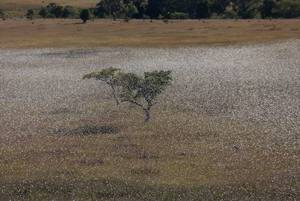Biblical Plague: Massive Locust Infestation Threatens Almost Two-Thirds Of Madagascar’s Population

Like a natural disaster of biblical proportions, the poor African island nation of Madagascar is suffering its worst locust plague in six decades, endangering its agricultural crops. According to a report in the Guardian newspaper, swarming locusts have already ruined one-fourth of Madagascar’s food crops, infested more than half of the nation’s cultivated acreage, and now threaten the livelihood and survival of 60 percent of the island’s 21 million people.
The United Nation’s Food and Agriculture Organization (FAO) has issued a warning that by September, 3.7 million acres, or two-thirds of the country, may be infested by the voracious insects, leading to widespread damage to the staple rice and maize crops. Experts estimate that as many as 500 billion hungry insects are eating their way across the island, destroying about 100,000 metric tons of vegetation daily, Agence France Presse reported.
FAO officials are gravely concerned that Madagascar’s agriculture and people are running out of time to deal with the plague. "We don't have enough funds for pesticide, helicopters and training," said Alexandre Huynh, the FAO's representative in Madagascar. "What is extremely costly is to run helicopters [to spray pesticides]. We have to start in September, and we have two to three months to prepare." José Graziano da Silva, FAO’s director-general, placed the crisis in starker terms. "If we don't act now, the plague could last years and cost hundreds of millions of dollars,” he said. “This could very well be a last window of opportunity to avert an extended crisis."
The last major plague of locusts in Madagascar, in the 1990s, took five whole years to eradicate and cost almost $51 million. FAO now says that $41.5 million will be needed over the next three years to effectively control the locust plague. “The plague will of course have a big impact on the cereal production. [It] will also have an impact on pastures. So that means that – not this year, but probably next year – there will also be an impact on the cattle – on the health of the cattle,” said FAO Locust Control Officer Annie Monard, according to Voice of America.
Compounding Madagascar’s woes, the country is already embroiled in a severe economic crisis as well as political instability arising from a 2009 coup d’état which overthrew President Marc Ravalomanana and installed a former mayor named Andry Rajoelina into power. Since Rajoelina’s emergence, Madagascar lost aid from the European Union and the United States, while the African Union suspended the country’s membership. Elections originally scheduled for later this month have been postponed for late August.
Meanwhile, since the coup (which has turned off tourists), poverty has intensified – according to World Bank figures, 92 percent of the population live on less than $2 per day, making Madagascar one of the world’s most destitute states. The Guardian noted that the lack of financial aid from western donors likely exacerbated the current locust plague as the government’s agricultural department lacked the resources to run the locust surveillance and monitoring program. As such, the spraying of pesticides in swamps, especially in the southern part of the island, was either curtailed or abandoned completely.
Madagascar’s chaotic political scenario likely makes donors wary of contributing funds to the country. “I think the current political situation in Madagascar is a bit difficult to assess for the donors and they could be a bit reluctant to invest,” Monard added. “Yes, the plague will be stopped, of course. But after that, will the government be able to maintain a locust preventive strategy? So that is also a question that donors have.”
© Copyright IBTimes 2024. All rights reserved.





















